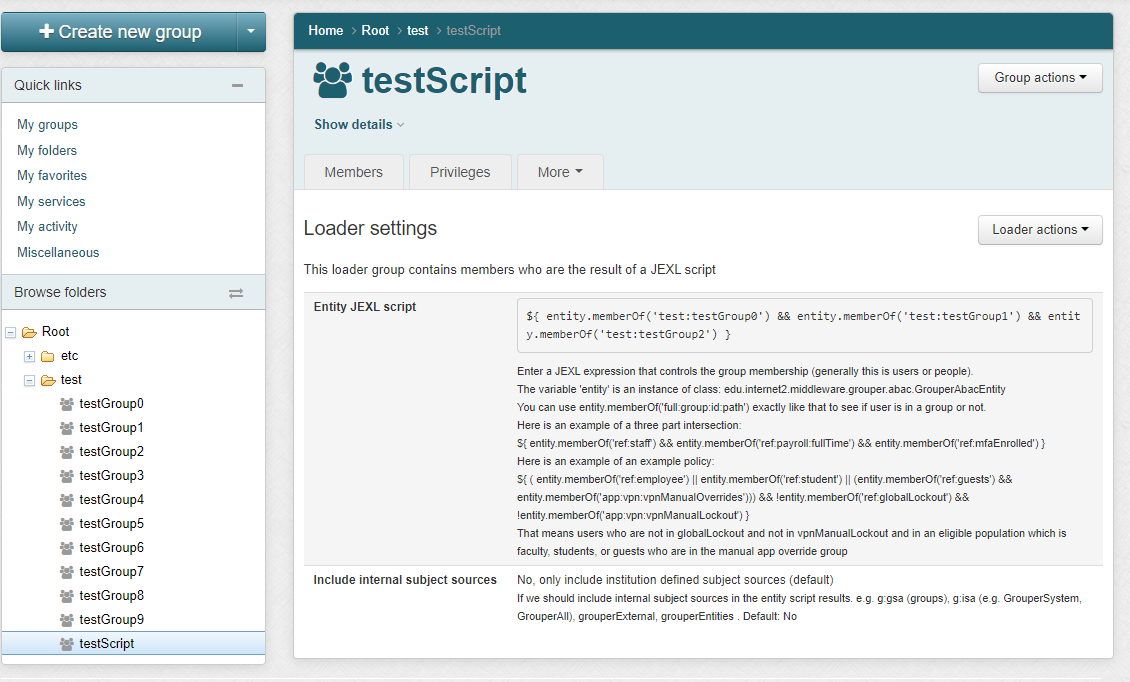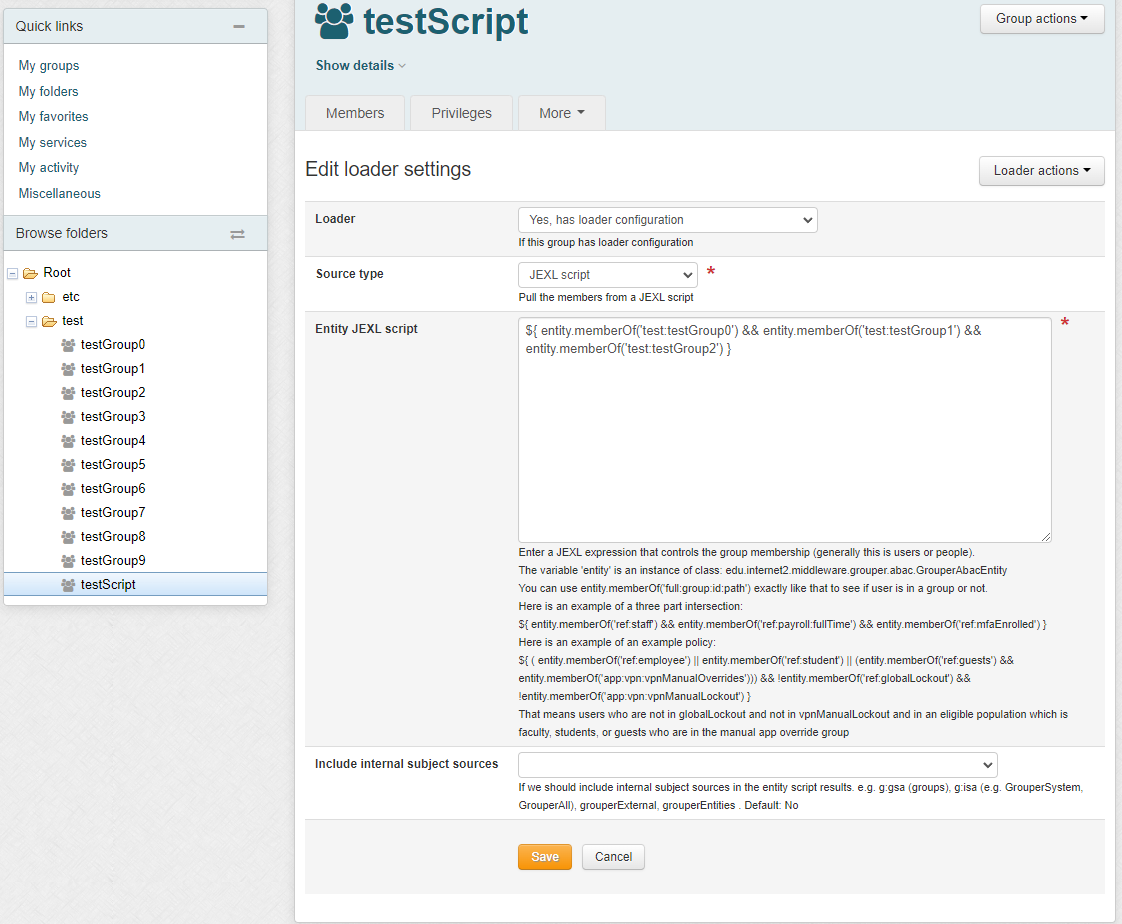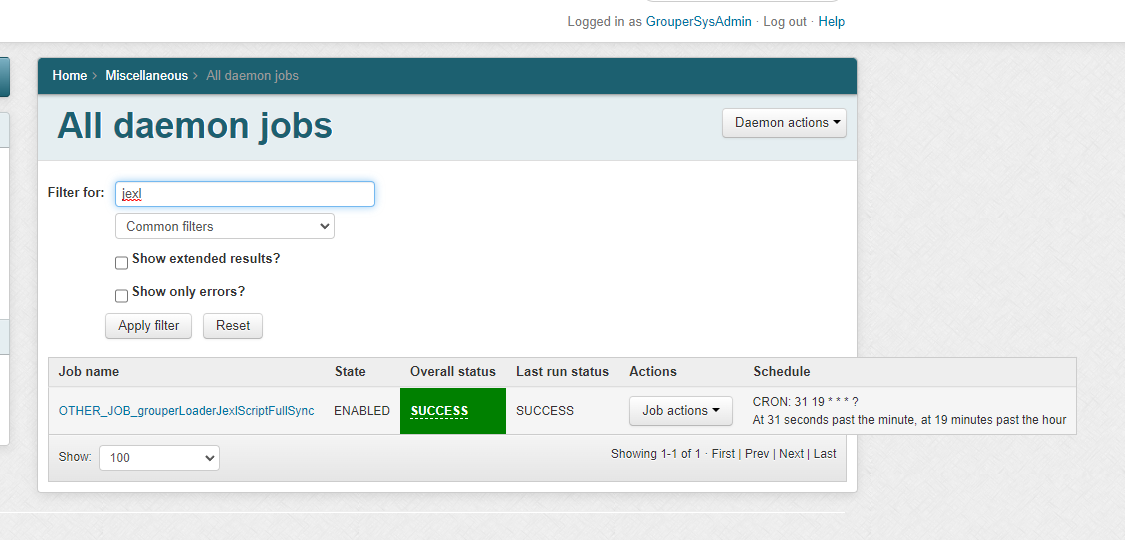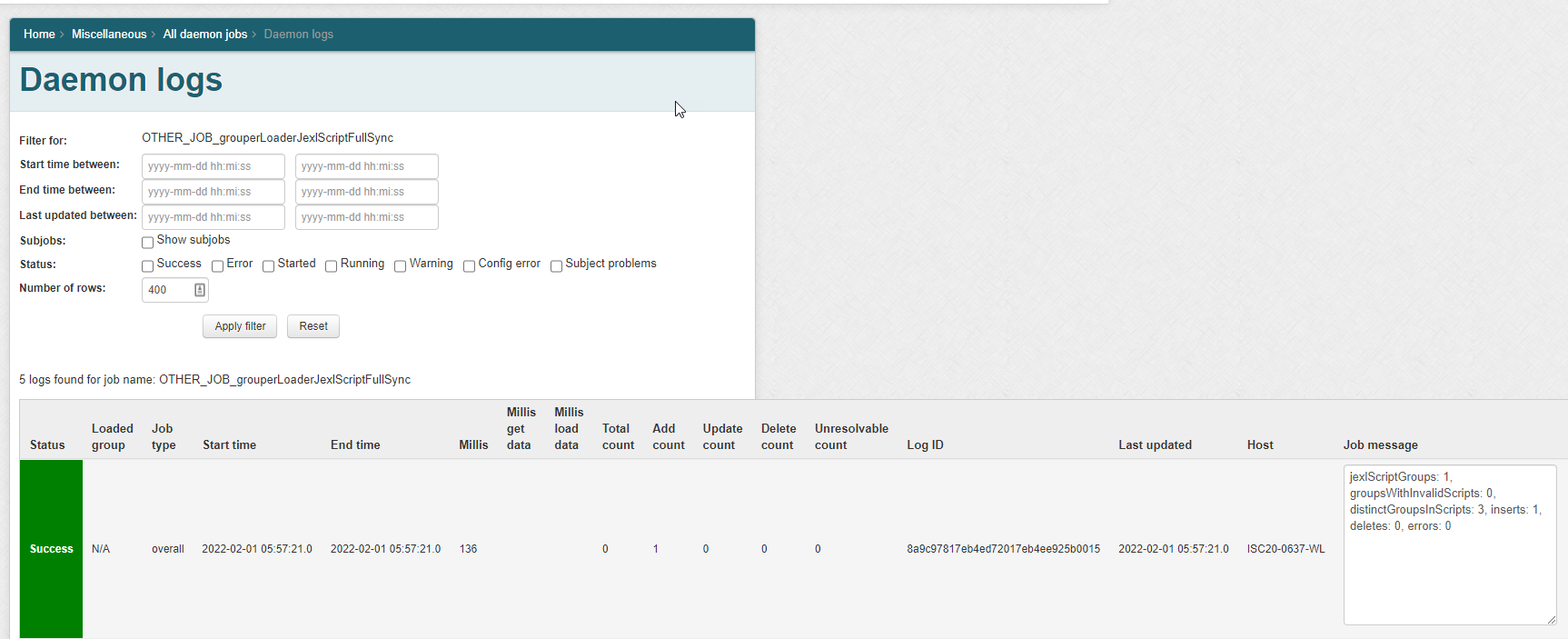In Grouper 2.6.6 there is a first pass at JEXL loaded groups. It is basic and can be built on. Note: this is subject to change as we see a working solution and discuss the optimal path forward
We want to be able to craft policies by an expression instead of creating loaders or tons of reference groups based on cartesian products of basis/ref groups.
Individual groups can be configured to automatically have their membership managed with individual subjects (or in future groups as members)
Why do we need this feature?
- Reduces pre-loaded rollups that might not be used
- You don't need a loader job for each one of these groups
- Any Grouper user could edit the policies if they can READ underlying groups. The expressions are secure (future state)
- The memberships of the ABAC groups are real time based on an intelligent change log consumer (future state)
- You can have a UI to help build it and give good error messages
- Could visualize the policies. Perhaps could be integrated into existing visualization (future state)
- This solves the issue of composites with any number of factors
UI to configure
Daemon screen
Note in Grouper v2.6.6 you need to wait an hour after changing a script, or run the JEXL script loader full job. In the future we will have an incremental and run the full nightly
Scripts
The script can only be written by people who can READ groups in the script and UPDATE the owner group. Since this is actually a JEXL script (not a JEXL expression), so you could have multiple lines, variables, conditionals, etc
In an entity script, the variable 'entity' is an instance of class: edu.internet2.middleware.grouper.abac.GrouperAbacEntity
You can use entity.memberOf('full:group:id:path') exactly like that to see if user is in a group or not.
| Expression | Description |
|---|---|
| ${ entity.memberOf('ref:staff') && entity.memberOf('ref:payroll:fullTime') && entity.memberOf('ref:mfaEnrolled') } | Three part intersection |
${ ( entity.memberOf('ref:employee') || entity.memberOf('ref:student') || (entity.memberOf('ref:guests') && entity.memberOf('app:vpn:vpnManualOverrides'))) && !entity.memberOf('ref:globalLockout') && !entity.memberOf('app:vpn:vpnManualLockout') } | Example policy That means users who are not in globalLockout and not in vpnManualLockout |
How it works
There are some trade-offs with performance and resources. This is the current implementation.
- Sees which groups are in the script
- Get the memberships of the owner groups and all script groups
- Consider if configured to include internal subject sources (adjust the membership lists)
- For each member of either the owner group or the script groups for that owner
- Setup the variables for a JEXL script
- Evaluate the script
- If the result does not match the current state of the membership, add or remove
- If a script evaluation fails, proceed with the job
TO DO
- Load groups as members
- Add incremental job
- Unit tests
- Better validation
- More methods to call (other than hasMember)
- Add subject attributes e.g. from global attribute resolver
- Failsafes
- Add delegated admin based on READ of groups
- Visualization
Parse expression with JEXL (for Grouper developers)
Feed the expression through this simple program
public static void main(String[] args) {
JexlEngine jexlEngine = new JexlEngine();
ExpressionImpl expression = (ExpressionImpl)jexlEngine.createExpression("group.campus !~ ['palmer', 'southern'] and group.termStart - 7 > sysdate");
ASTJexlScript astJexlScript = (ASTJexlScript)GrouperUtil.fieldValue(expression, "script");
printNode(astJexlScript, "");
System.out.println(expression);
}
public static void printNode(JexlNode jexlNode, String prefix) {
System.out.println(prefix + jexlNode.getClass().getSimpleName() + (StringUtils.isBlank(jexlNode.image) ? "" : (": " + jexlNode.image)));
String newPrefix = StringUtils.isBlank(prefix) ? "- " : (" " + prefix);
for (int i=0;i<jexlNode.jjtGetNumChildren();i++) {
printNode(jexlNode.jjtGetChild(i), newPrefix);
}
}
Output
ASTJexlScript
- ASTAndNode
- ASTNRNode
- ASTReference
- ASTIdentifier: group
- ASTIdentifier: campus
- ASTReference
- ASTArrayLiteral
- ASTReference
- ASTStringLiteral: palmer
- ASTReference
- ASTStringLiteral: southern
- ASTGTNode
- ASTAdditiveNode
- ASTReference
- ASTIdentifier: group
- ASTIdentifier: termStart
- ASTAdditiveOperator: -
- ASTNumberLiteral: 7
- ASTReference
- ASTIdentifier: sysdate
Grouper can take that object model and see which group and subject attributes are related, print out a nice analysis of the policy, and know which policies are affected by real time changes
Expression 2: campus is palmer or southern, or the term is current with some overlap
group.campus =~ ['palmer', 'southern'] or (group.termStart - 7 > sysdate and group.termStart - 7 < sysdate)
Expression 3: campus is palmer or southern, or the term is current with some overlap
person.primaryAffiliation =~ ['faculty', 'staff'] and person.dept =~ ['physics', 'math']
Analyze policy
To confirm a policy is correct, a long form translation of the policy can be displayed along with group names and group counts
Full sync
A nightly full sync will occur. The incremental sync should stop. Make sure all the loaded groups are up to date.
Incremental sync
An incremental change log consumer can
- If group attributes change, see if it affects group attributes (future state)
- If attributes change, see which policies those refer to, and incrementally adjust the membership of those groups
- Policy changes should change the population



